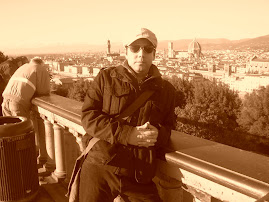
One of Luther Burbank's many botanical breakthroughs was the development of the thornless cacti. Here, you can see one of the large cacti bushes full of "prickly pears" or Mexican tunas. I ended up buying a small thornless cacti for my parents. When I returned to Los Angeles, they immediately planted it in our backyard.
Speaking of non-prickly nopales, I found this great article about the rise in LLMs at U.S. law schools. LLMs are degrees for non-U.S. lawyers. They are usually a year long, and help an international lawyer become familiar with the U.S. legal system.
They Rule the World
One-year LLM programs at U.S. law schools are on the rise again, attracting fledgling power brokers from around the world
Michael D. Goldhaber
The American Lawyer
09-14-2005
"Mikheil Saakashvili left the former Soviet Republic of Georgia in the early 1990s to get a degree at Columbia Law School -- then returned to lead a democratic revolt. In late 2003 Saakashvili rallied his countrymen against corruption in the so-called Rose Revolution, elbowing out former president Eduard Shevardnadze. Today Georgian cabinet meetings have the feel of an Ivy League seminar, with the foreign minister and deputy justice minister also trained in American law.
"Such is the power of the LLM, the one-year advanced degree that allows foreign lawyers to attend U.S. law schools. These degrees are rarely regarded as revolutionary -- and yet they promote political change. "LLMs are undoubtedly the most effective rule-of-law programs," says Bryant Garth, the incoming dean at Los Angeles' Southwestern University School of Law and the longtime director of the American Bar Foundation. "You create friends. You create people who understand U.S. models. You build an army of advocates for reform."
"In the age of globalization, LLMs also cater to the needs of aspiring corporate lawyers (and those who hire them). Just listen to Claudio Cocuzza, who founded Milan's Antonelli Cocuzza & Associati after receiving an LLM at the University of Pennsylvania Law School in 1988. "To be an international business lawyer, you need to study in the U.S. or U.K.," he says. "It's no longer optional." The LLM helps foreign lawyers understand U.S. clients and provides a network of contacts around the world -- one of Cocuzza's former classmates is now the general counsel of a major French company.
"LLM programs quietly boomed in the 1990s, then experienced a sudden dip that went equally unremarked upon, even as the press bemoaned the general falloff in foreign student enrollment at American universities. According to the Institute of International Education, a New York-based nonprofit that conducts an annual survey of higher education, the number of international students studying law at U.S. colleges and universities rose by 90 percent between 1994 and 2001 -- from 3,453 to 6,552 -- and then dropped by about 5 percent in the two years after September 11. Although the top LLM programs never suffered a drop in enrollment, most saw a temporary decline in applications of about 10 percent after 9/11.
"A similar pattern can be seen in the United Kingdom, the world's other magnet for overseas law students. According to Britain's Higher Education Statistics Agency, the number of foreigners obtaining first degrees in U.K. law, roughly the equivalent of a J.D., jumped by 75 percent in the five years from 1998 to 2002 (from 3,555 to 6,270), then dipped by 2 percent.
"Explanations vary for the sudden enrollment dip. Adam Kolker, Penn's dean for international studies, does not believe that the post-9/11 tightening of U.S. immigration law played a role -- law students can handle the extra paperwork. But Kolker does believe that some foreigners were turned off by America's post-9/11 foreign policy. Jeanne Tai, who directs graduate admissions at Harvard Law School, attributes most of the decline to a drop in Asian applications, which coincided with the growth of alternative programs in China and Australia. In any event, there are signs that the 9/11 effect is over, with both Columbia and Penn reporting a 10 percent rise in LLM applications from 2004 to 2005.
"Look out, world! The credentials of LLM students can dazzle even before they enter the program. The 200 students in Columbia's 2005 LLM class (roughly double that school's LLMs in 1995) hailed from 50 nations. A recent class of entering students included the general counsel of Haiti's Central Bank and the dean of Mozambique's law school, as well as senior advisers to the Guatemalan Truth Commission and to New Zealand's Ministry of Maori Affairs.
"Lawyers like these are unstoppable when armed with another degree. Former LLMs Giuliano Amato of Italy and Mary Robinson of Ireland rose to become heads of state. A third of the judges on the International Court of Justice hold graduate degrees from U.S. law schools. And in Taiwan, which rivals Georgia for LLM power, U.S. alumni include the vice president, the mayor of Taipei, and at least two grand justices.
"Harvard's LLM program is probably the most influential, and certainly the boldest in documenting its influence. Its graduates range from salsa star Ruben Blades, who studied law in Panama before he got famous, to Saudi oil diplomat Sheikh Ahmed Zaki Yamani. The roster of Cambridge-trained LLMs includes three general counsel of the World Bank, two prime ministers of Peru, two U.S. ambassadors from Papua New Guinea, foreign ministers of the Netherlands and Thailand, an International Criminal Court judge, the advocate general of the European Court of Justice, and the secretary general of Amnesty International. And that's not to mention professors placed at more than 50 law schools overseas.
"Of course, most foreigners with this quickie credential go into business law -- and some create leading national firms. "If you take corporate law firms anywhere in world," says Southwestern's Garth, "you'll find that the pioneers are LLMs." Three prominent examples are Zia Mody of India's AZB & Partners, a Harvard grad; Wei Xiao of China's Jun He Law Offices, a Columbia grad; and Ken Tsunematsu of Japan's Nagashima Ohno & Tsunematsu, also a Columbia grad. Garth sees such Western-style law firms as a keystone of the U.S. model for economic growth.
"Whether they aim for the public or private sector, LLMs are often subsidized by private foundations, governments, and law schools. The ultimate LLM success story may be Saakashvili, who studied here on a U.S. State Department scholarship and is now a freedom fighter with the George W. Bush stamp of approval. But grantmakers see all LLM students as a good investment. Martha Loerke, the director of scholarships at George Soros' Open Society Institute, says that private lawyers bolster the rule of law, too.
"These days, grant money is more available than ever. In a pioneering program, the Ford Foundation sponsored more than 250 Chinese graduates between 1982 and 1997, shaping the first generation of modern lawyers on the mainland. The Institute of International Education, which administers the Fulbright Program for the U.S. State Department, has increased its legal scholarships by 400 percent over the past ten years, from 29 in 1995 to 122 in 2004. The Open Society Institute began sponsoring Palestinian LLMs in 2003 and plans to bring ten Palestinian lawyers to the U.S. next year.
"The law schools, which conceive of their mission in grand terms, often match such scholarships. "The role of an LLM program in a great university," explains Alice Hammerli, Columbia's dean of graduate legal studies, "has always been to train lawyers who will return to their home country and play constructive roles in their societies." Harvard's Baker says that the LLM doesn't promote goodwill toward America so much as curiosity. "We strive to instill a more complex understanding of the complex society we live in," she says. "[In the end] the students may feel either better or worse about that society."
"Indeed, some LLMs come away with bitter feelings about America. David Marshall, a Canadian attorney now working for the United Nations in Geneva, attended Harvard during the politically charged academic year of 2001-02. Marshall found that his fellow LLMs were likelier to read the left-leaning London broadsheets than they were to read The New York Times. And their politics showed it. "There was an unfortunate division in the class over 9/11," recalls Marshall. "Half thought the U.S. bore responsibility, and half were horrified at that."
"Marshall says Harvard did not sway the opinions of its foreign protégés so much as add to their intellectual toolkits. That goal is shared by Garth, who is pleased when LLMs are picky about which aspects of U.S. law they emulate. "Even when they criticize America," says Garth, "they use [U.S.] models and materials."
"Then there are alumni who simply love America, like Gocha Lordkipanidze. He attended Harvard last year -- a decade after Saakashvili attended Columbia -- and then became a foreign policy adviser to the Georgian prime minister.
"It definitely has an impact on our careers and our lives," Lordkipanidze says of his LLM experience, speaking by phone from Georgia. "It's ingrained in every piece of paper I'm writing or action I'm taking for the government of Georgia. After Harvard, I'm neither European nor American, but at peace with both ways of thinking."
"Lordkipanidze aims to keep the bloom on the Rose Revolution. But most LLMs will probably build rule of law the lucrative way -- one corporate deal at a time."
This article was found on www.law.com on September 14th, 2005.


2 comentarios:
You may have heard of this garage sales information website website that pretty much covers garage sales information website related stuff.
You could by to check it out, when you get the time. They have good stuff!!
Thank you for reading my blog. But I would appreciate it if your comments were relevant to this site. Advertising on the comments section of blogs like this is both ineffective and a nuisance.
Publicar un comentario